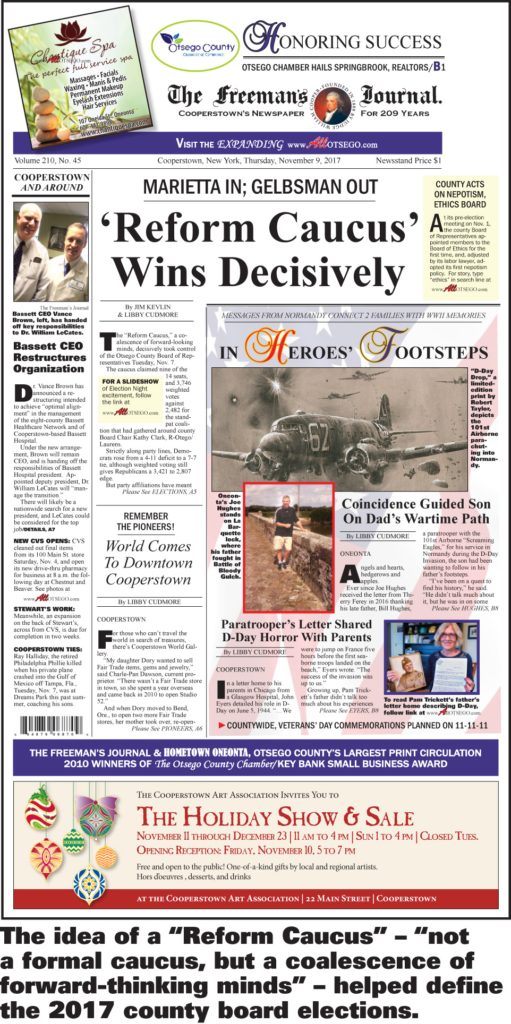‘Reform Caucus’ Proving Its Worth, But Will It Survive 2019 Elections?

Leading up to the 2017 election of the Otsego County Board of Representatives, the terms “Reform Caucus” and “Sensible Center” were used in this space, and they were controversial.
Some of the candidates identified with that label won election or reelection. (Whether that was because of or despite of the designation is certainly fodder for debate.)
Foremost among them, as it turns out, was David Bliss, R-Cooperstown/Town of Middlefield, who was then elected board chair, and who’s proved: Simple politeness has made all the difference.
Two others in the Sensible Center, Andrew Marietta, D-Cooperstown/Town of Otsego, and Peter Oberacker, R-Schenevus, have emerged as leaders.
Through hard work and diplomacy evident since, Meg Kennedy, C-Mount Vision, would certainly have been included in the “Reform Caucus” – defined in this space as “not a formal caucus, but a coalescence of forward-thinking minds” – if editorial writers could only predict the future. (Bulletin: They can’t.)
•
This is stage-setting for “County Board: Elections 2019.” Curtains up, the drama has begun.
At least two representatives, both Oneonta Democrats, are retiring – veteran Gary Koutnik, D-Oneonta, vice chair of the Republican-controlled board, and freshman Liz Shannon, a former Common Council member.
So far, Clark Oliver, a SUNY Oneonta poly-sci student, and Jill Basile, a college and non-profit administrator active in community life, are seeking to succeed Koutnik and Shannon respectively.
But much more ferment is possible, with the emergence of Republican Rick Brockway of Laurens, retired teacher, farmer and Daily Star outdoor columnist, as a challenger to Kathy Clark, the former chair. If he’s successful, that, indeed, could be a game changer, signaling the end of that unhappy, pre-Bliss era.
•
But no one should count their chickens yet.
Clark, if she decides not to retire, could turn back Brockway’s challenge. Oliver is very green, so Koutnik’s seat could go to a yet-to-emerge Republican (or another Democrat). Michele Farwell, D-Morris, won in the Republican Butternut Valley district when two GOP contenders split the vote. So she faces uncertainty, even though she, along with Kennedy, are leaders in the county board’s effort to come up with an open-minded energy policy.
The Town of Oneonta can go either Republican or Democratic, and a GOP committee there is seeking candidates for town board, but also to challenge Democratic county rep Andrew Stammel.
If those four seats shift, a Clark-Frazier Restoration is not out
of the question. (Ed Frazier, R-Unadilla, was the former chair’s vice chairman.)
•
For his part, county Republican chairman Vince Casale said, “all of our candidates are running for reelection. I’m not expecting any surprises” – except, of course, Brockway vs. Clark.
When seats open up after a long tenure ends, as in Koutnik’s case, that generates interest, he said. However, in cases where reps are “doing a good job” – he singled out Marietta – Republicans may not field an opponent, Casale said.
By contrast, he said, local Democrats are “acting like the national Democrat group, even to the point of ostracizing their own” – he mentioned the pioneering former county chair, Richard Abbate, and Richard Sternberg, architect of the 2017 campaign that achieved a near-balance on county board.
For her part, Aimee Swan, the new Democratic county chair, said, “It’s the goal of the committee to run and elect Democrats. You can expect we’re going to run Democrats everywhere we can.”
•
That leaves it to the electorate, as it should be.
Representatives in the Sensible Center are saying they’re hoping to come out of this cycle with stability – it can take months to bring newcomers up to speed.
That’s particularly important now, because they see a consensus forming on the need for a professional county manager to help run a $110 million government, and an ever more complex one.
Second is a concern that the county’s 21-member “Energy Task Force,” which convened for the first time Wednesday, Feb. 28, get it right: i.e., comes up with a plan that balances short-term demand for natural gas with a speedy-as-possible shift toward renewables.
Because a new state law moved the state primary from September to June 25, to align it with the federal primary, things are happening quickly.
Expect the ferment we’re already seeing to only intensify by April 4, the deadline for candidate petitions to filed with the county Board of Elections.
Let’s pay attention: Even
more than usual, this election
may matter.

